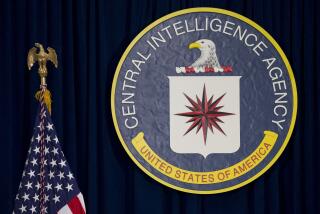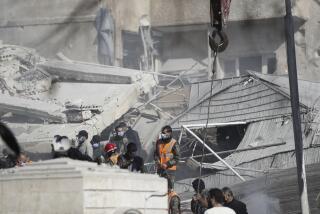CIA forced to curb spying in Lebanon
The CIA was forced to curtail its spying in Lebanon, where U.S. operatives and their agents collect crucial intelligence on Syria, terrorist groups and other targets, after the arrests of several CIA informants in Beirut this year, according to U.S. officials and other sources.
“Beirut station is out of business,” a source said, using the CIA term for its post there. The same source, who declined to be identified while speaking about a classified matter, alleged that up to a dozen CIA informants have been compromised, but U.S. officials disputed that figure.
U.S. officials acknowledged that some CIA operations were suspended in Beirut last summer. It’s unclear whether full operations have resumed. Beirut is considered a key watching post for turmoil in the Middle East.
Senior CIA officials have briefed congressional staffers about the breach, and Rep. Mike Rogers (R-Mich.), who chairs the House Intelligence Committee, visited Beirut recently to interview CIA officers. Committee staff members want to determine whether CIA operatives used sloppy practices that revealed sensitive sources and methods.
Much in the case remains unclear, including the extent of the damage and whether negligence by CIA managers led to the loss of the Lebanese agents.
According to the source, CIA case officers met a series of Lebanese informants at a local Pizza Hut, allowing Hezbollah and Lebanese authorities to identify who was helping the CIA. U.S. officials strongly disputed that agents were compromised at a Pizza Hut.
U.S. officials also denied the source’s allegation that the former CIA station chief dismissed an email warning that some of his Lebanese agents could be identified because they used cellphones to call only their CIA handlers and no one else.
Hezbollah, an Iranian-backed militant group that the U.S. considers a terrorist organization, and Lebanon’s internal security service have used software to analyze cellphone calling and location records to help them identify a network of alleged Israeli spies since 2007, according to several people familiar with the case. Dozens of people were arrested.
In 2010, U.S. counterintelligence officials determined that the CIA’s Lebanese agents could be traced the same way, the source said. But the station chief allegedly ignored the warning. “He said, ‘The Lebanese are our friends. They wouldn’t do that to us,’ ” the source said.
The Times is withholding the former station’s chief’s name because he remains undercover. He now has a supervisory role at CIA headquarters in operations targeting Hezbollah. The CIA declined to make him available for comment.
“Espionage has always been a complex business,” said a U.S. official, who declined to be identified in discussing the Lebanon case. “Collecting sensitive information on adversaries — who are aggressively trying to uncover spies in their midst — will always be fraught with risk.”
Hezbollah is “an extremely complicated enemy,” the official added. “It’s a determined terrorist group, a power political player, a mighty military and an accomplished intelligence organization — formidable and ruthless. No one underestimates its capabilities.”
In June, Hezbollah’s leader, Sheik Hassan Nasrallah, announced the arrest of three of its members. He said two were “affiliated with the CIA, and one more might be affiliated with either the CIA, European intelligence or Mossad,” Israel’s foreign intelligence service.
Nasrallah did not disclose their names, explaining that he wanted to protect their families, “whom I know personally.” He said that CIA officers, working under diplomatic cover at the U.S. Embassy, had recruited them in early 2011.
The U.S. Embassy dismissed the charge. “These are the same kind of empty allegations that we have heard repeatedly from Hezbollah,” it said in a statement.
Lebanon’s security service was able to isolate the CIA informants by analyzing cellphone company records that showed the numbers called, duration of each call and location of the phone at the time of the call, the source said.
Using billing and cell tower records for hundreds of thousands of phone numbers, software can isolate cellphones used near an embassy, or used only once, or only on quick calls. The process quickly narrows down a small group of phones that a security service can monitor.
In 2005, an Italian prosecutor used cellphone calling and location records to help identify 26 Americans who he said took part in a 2003 abduction of a Muslim cleric on a street in Milan. A judge later convicted 23 Americans, including the CIA’s former Milan base chief, in absentia for their role in the “extraordinary rendition” case.
Washington has given Lebanon’s government more than $1 billion in various forms of aid since 2006 and has proposed an additional $236 million in aid this fiscal year.
The Obama administration has struggled with the relationship since 2008, when Hezbollah fighters seized control of parts of Beirut. That resulted in an Arab-brokered peace deal that gave Hezbollah a major role in Lebanon’s government.
The group’s political arm now has 16 of the 30 seats in the Cabinet of Lebanon’s prime minister, Najib Mikati. Hezbollah is also active in Lebanon’s security and intelligence services.
More to Read
Start your day right
Sign up for Essential California for news, features and recommendations from the L.A. Times and beyond in your inbox six days a week.
You may occasionally receive promotional content from the Los Angeles Times.







